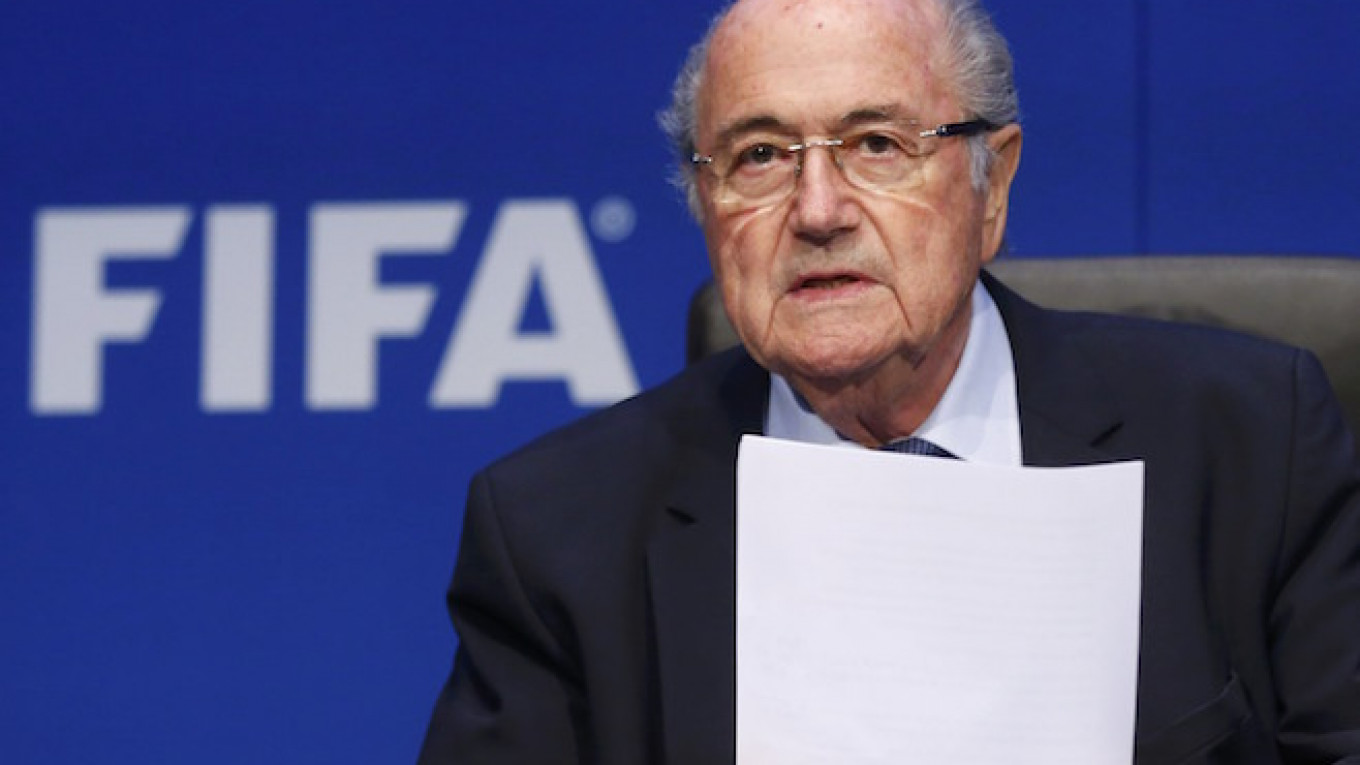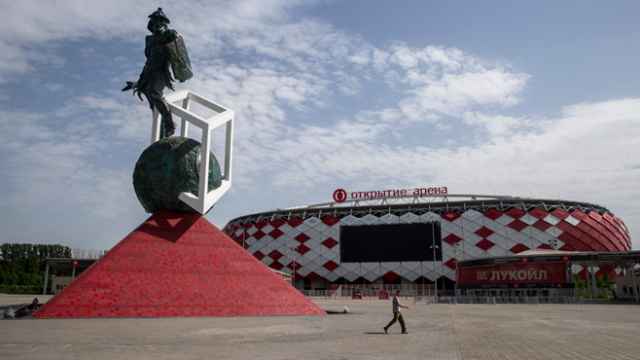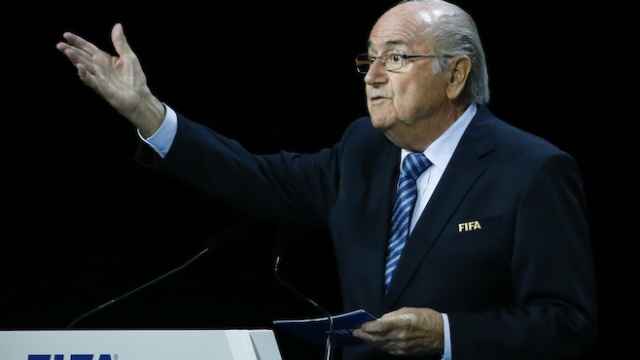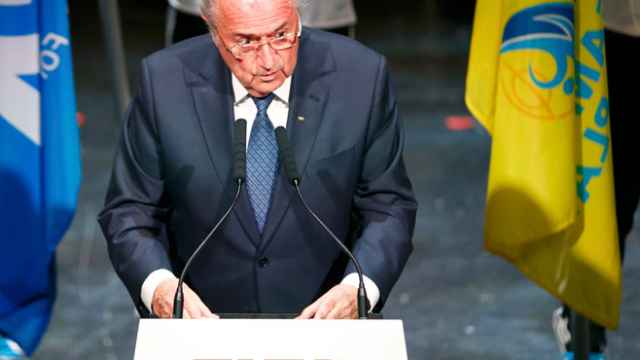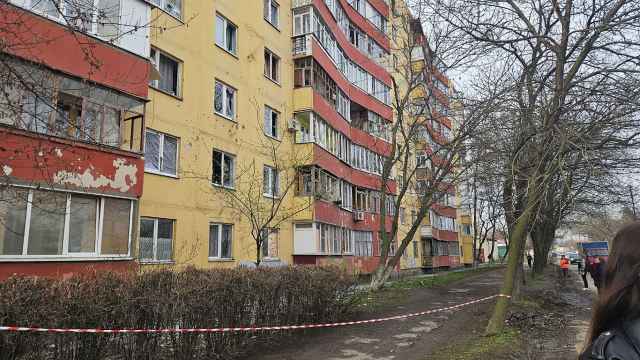FIFA President Sepp Blatter began his fifth term at the helm of soccer's governing body on Saturday facing the daunting task of restoring public faith in an organization tainted by allegations of corruption and deeply divided over his re-election.
Blatter, 79, won a vote on Friday to serve a fifth term as FIFA president even though the U.S. Department of Justice has charged nine soccer officials with corruption and Swiss authorities are conducting their own criminal investigation.
Russian President Vladimir Putin has sent a telegram to FIFA President Sepp Blatter congratulating him on his re-election, the Kremlin said on Saturday.
"The head of the Russian state expressed confidence that experience, professionalism and high authority will help [Joseph] Blatter in future encourage the spread in the geography and popularity of football in the whole world," a Kremlin statement said.
Russia's reaction is in stark contrast to the reaction of many European nations to Blatter's victory, which came two days after news broke of a major bribery scandal being investigated by U.S., Swiss and other law enforcement agencies that plunged FIFA into the worst crisis in its 111-year history.
Britain said Europe should consider boycotting future World Cups if Sepp Blatter doesn't quit as head of soccer's governing body over the corruption scandal.
The Swiss-born FIFA chief complained on Sunday he had been shown "zero respect" in recent days, revealing how he had rejected advice from one of his main critics, the head of the European governing body, to quit at last week's FIFA congress.
John Whittingdale, the British government minister with overall responsibility for sport, renewed calls for Blatter to step aside on Sunday, saying all options should be considered when it came to pressuring him to resign, including boycotting the World Cup — something that could split the sport and be calamitous for the tournament.
Blatter has played down the impact of the scandal on one of the world's most powerful sports bodies, which takes in billions of dollars in revenue from television marketing rights and sponsorships.
Blatter is not accused of any wrongdoing personally and has implied that the United States timed news of the charges to try to scupper his re-election.
Britain's Sunday Times newspaper reported Swiss prosecutors would question Blatter, who has led FIFA for nearly 20 years, as part of a criminal investigation into votes to award the 2018 and 2022 World Cups to Russia and Qatar respectively.
A spokesman for Switzerland's attorney general dismissed the possibility of immediately calling in Blatter as "nonsense."
"The president of FIFA will not be questioned at this point in time," the spokesman told Reuters. However, he added: "If need be, he will be questioned in the future."
The Sunday Times reported Blatter would be the last of 10 FIFA officials to be questioned.
Michel Platini, the president of the European governing body UEFA, and Vitaly Mutko, the Russian sports minister, would also be interviewed, it said.
In the Swiss newspaper interview, Blatter described a meeting he had on Thursday with Platini, when the former French international star encouraged him to quit honorably.
"He said in all seriousness: 'Sepp, hold the congress and at the end say you're stepping down. You'll have a gigantic party thrown for you, and you can keep your office here at FIFA,'" Blatter said, adding that he had refused Platini's invitation to have the conversation over a glass of whiskey.
Blatter comfortably won the FIFA vote with strong support from developing nations, which have received generous funding from FIFA to develop the sport under Blatter's leadership.
Britain — which has been one of Blatter's fiercest critics, especially since England lost a bid to host the 2018 World Cup — stepped up the pressure on Sunday.
"Last week, some of the game's most respected figures raised the prospect of world football turning its back on FIFA," Whittingdale, who is Britain's secretary of state for culture, media and sport, wrote in the Sunday Times.
"Michel Platini has talked of European nations boycotting future World Cups if Blatter refuses to stand down. No options should be ruled out," he said.
Prime Minister David Cameron and Greg Dyke, the chairman of England's Football Association, have urged Blatter to quit.
Prince William, who lobbied for Britain to host the 2018 tournament along with star player David Beckham, has also spoken of the need for FIFA to reform.
FIFA had long been a "byword" for fraud, sleaze and corruption, Whittingdale said, accusing Blatter of treating soccer with contempt and of losing "the few shreds of credibility he had left."
"Now, thanks to the twin investigations by the FBI and Swiss attorney general's office, FIFA executives will finally be forced to defend themselves in court," he wrote.
Germany, the reigning world champions, also called for change.
Foreign Minister Frank-Walter Steinmeier told Die Welt am Sonntag newspaper that soccer brought people around the world together.
"That should be the real legacy of FIFA. I have serious doubts, whether FIFA is up to this great task without a clear new start," he said.
Many soccer experts regard a European-led boycott as an unrealistic proposition, believing that if it went ahead it would be a disaster for a sport that has avoided the kind of splits that have weakened others. Boxing, for instance, is now governed by four world bodies.
Dyke said it would be "ridiculous" for England to boycott the next World Cup in 2018 in protest because it would not have an impact. "It's got to be done by enough nations to have an impact, if it's done," Dyke told BBC TV's "The Andrew Marr Show," saying any kind of action needed to be with others. "We've got to do it alongside other countries, other large footballing nations," he said, saying it would be a "good idea" to pressure other footballing nations and sponsors to make sure any effort was concerted.
A Message from The Moscow Times:
Dear readers,
We are facing unprecedented challenges. Russia's Prosecutor General's Office has designated The Moscow Times as an "undesirable" organization, criminalizing our work and putting our staff at risk of prosecution. This follows our earlier unjust labeling as a "foreign agent."
These actions are direct attempts to silence independent journalism in Russia. The authorities claim our work "discredits the decisions of the Russian leadership." We see things differently: we strive to provide accurate, unbiased reporting on Russia.
We, the journalists of The Moscow Times, refuse to be silenced. But to continue our work, we need your help.
Your support, no matter how small, makes a world of difference. If you can, please support us monthly starting from just $2. It's quick to set up, and every contribution makes a significant impact.
By supporting The Moscow Times, you're defending open, independent journalism in the face of repression. Thank you for standing with us.
Remind me later.


